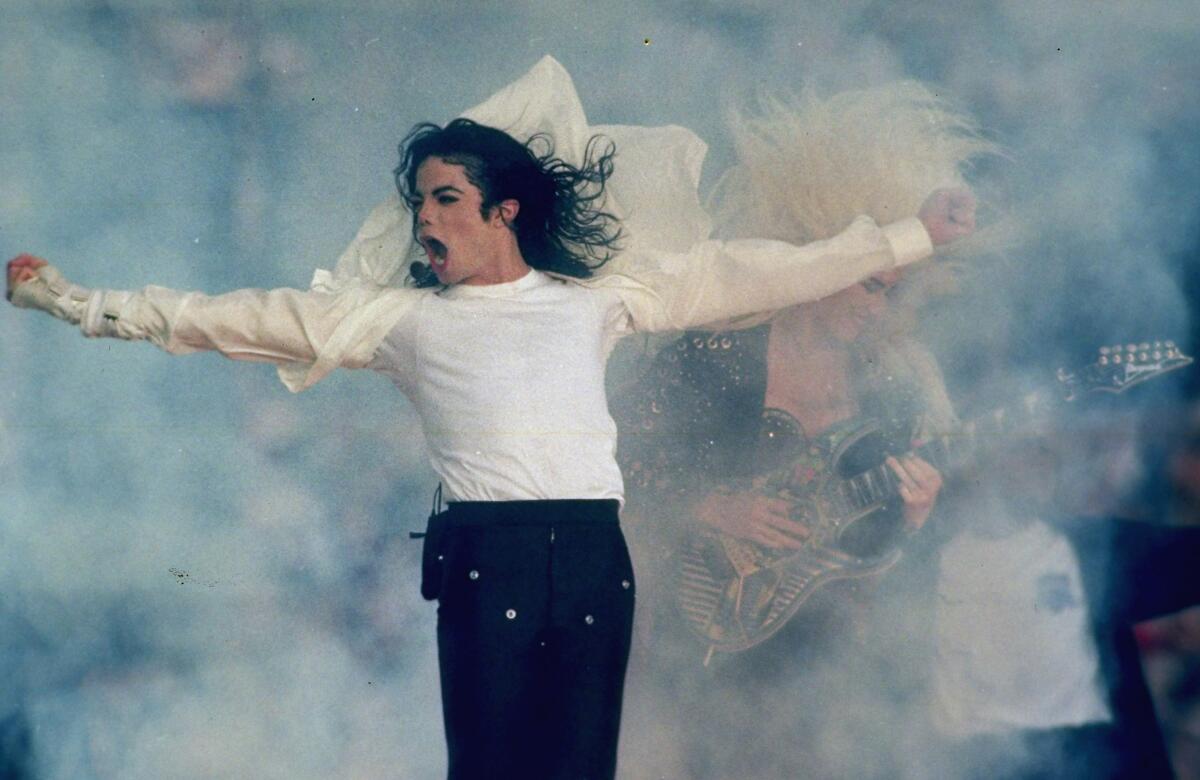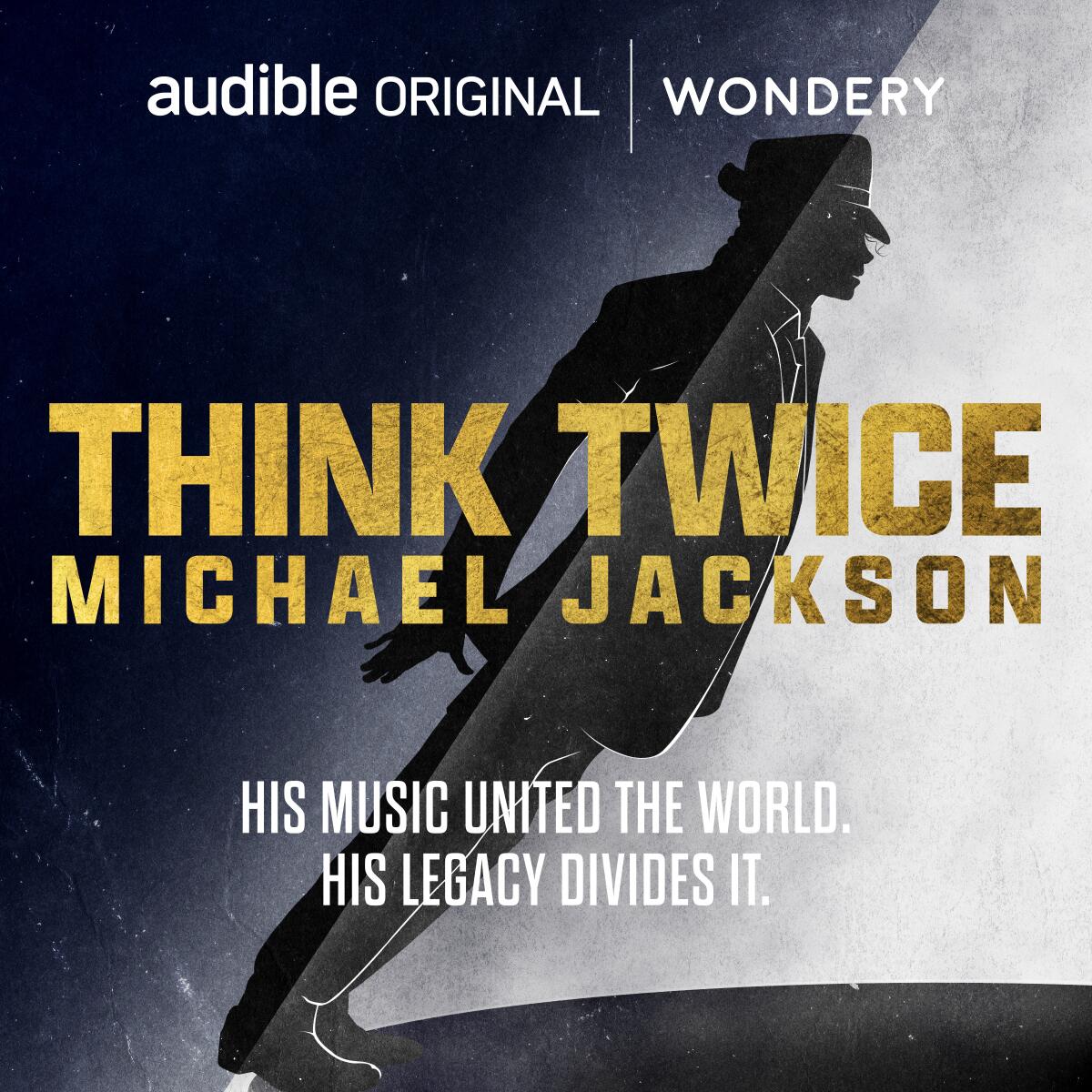New podcast explores how Michael Jackson wielded tabloids in his own myth-making

- Share via
In the almost 14 years since Michael Jackson’s death, his legacy, achievements and controversy have been analyzed and debated beyond mere celebrity scrutiny to a level comparable to political and religious leaders. The ubiquity Jackson had for decades and the memories we’ve created around him have left a daunting amount of projects and milestones to be explored. In the new podcast series Think Twice: Michael Jackson (premiering Thursday), journalist and historians Leon Neyfakh and Jay Smooth take a nuanced look at Jackson’s life from his childhood through the aftermath of his death with each of the 10 episodes bringing layers of curated detail between audio clips of the people who experience The King of Pop through a wide range of different interactions. The hosts spoke with The Times detailing all that went into its creation.
Given how extensive and daunting the entirety of Michael Jackson’s career and public life has been, where was the starting point for putting this show together?
Leon Neyfakh: We approached it in much the same way we approached our political history stuff. Whether it’s Watergate or the AIDS crisis, we kind of start out the same way every time. We try to read everything that’s out there, watch documentaries. We start with a timeline and once that timeline was in place, try to figure out where were the turning points in the story. And once you have that, you start to ask yourself “What do these eras tell us better than any others?” Then you ask yourself “Who can we talk to?” That’s the beginning, and then there’s a lot of rearranging. We may get to Episode 10 of the process and realize “oh, we can plant the seed for this earlier.” It’s pretty meticulous. You’re reporting while you’re writing while you’re thinking and hoping each part of that is informing the rest.
Jay Smooth: I came into it after Leon and his team had been working on it for a while and it got overwhelming pretty quickly recognizing how many wormholes you could dive into in the Michael Jackson story. It’s like one of those role-playing games like Skyrim or Cyberpunk where there’s ostensibly a main story line but hundreds of thousands of side quests you could go on. It definitely took some time.
While going through the entirety of Michael Jackson’s career, life and legacy was there anything that left you feeling surprised you had either forgotten about or didn’t know about?
Neyfakh: My favorite is the Super Bowl performance in ’93. I saw on Twitter there was a thread of people naming their favorite “I’m him” moments where [someone is] flexing on the whole world. A few people were like “It’s Michael Jackson at the Super Bowl in 1993 where he came out, stood there like a statue and didn’t say a word for more than a minute while the entire arena exploded in applause.” We learned this incredible fact from people who worked on that Super Bowl halftime show that the people at the football game were actually confused about what was going on and thought there had been a technical malfunction. It had been awkward in the arena, but the way the producers fixed the situation was by pumping in artificial crowd noise to make it seem like the whole arena was going nuts for Michael. For me, that kind of detail just opens the world — it shows you how a legend gets constructed and the reality we all take for granted isn’t always what it seems.
Smooth: I was struck by similar things in terms of seeing all of the strategy and calculated framework that goes into building the public persona that we’ve had a relationship with all these years. Another example is learning how intricate and involved Michael’s relationship was with the tabloid press. I remember him lamenting the National Enquirer putting up these pictures of him in the hyperbaric chamber, “I can’t believe they’d say these things about me!” But we learned from speaking to people at the Enquirer and learning how the tabloid media functioned at that time that Michael and his team were actively involved with pitching stories for places like the Enquirer to run. It’s easy to sort of see Michael as this sort of naive, passive figure that was buffeted about by the lifestyle he was born into, and in some ways that’s definitely true, but the more you dig into it, the more you learn that he was very savvy and calculated about trying to control how the world saw him, and then of course ultimately it became something bigger than he could control and he was just being carried along in this tidal wave to some strange places.

Do you think Michael’s specific dichotomy of being both a perpetually childlike Peter Pan-esqe persona and a very music business-savvy one was intentional?
Neyfakh: My first instinct is that I think he wanted to be seen as a very deliberate musician. I think he wanted people to see him as an artist who meant every note. I think he was invested in people recognizing his artistry and I think that level of deliberateness and creativity and agency is a little bit at odds with the other side of that coin, which is sort of this stunted somewhat childlike naive who just floats through the world.
Smooth: I’m wary of trying to read someone’s mind too much, but he certainly did seem to want the world to perceive him as someone who didn’t have a childhood, as a “Peter Pan.” How much of that is a calculated thing, how much of that is how he comes to terms with his own clearly incredibly difficult childhood — who’s to say? I think one of the things that is driven home over and over again in the series is that there’s rarely one way to read a human being, and especially one who had a private self and such a massive public persona as well. I think Michael and we as listeners and consumers, there’s lots of human nuance and contradiction all throughout each side of that.
There’s a substantial amount of content that you understandably give a trigger warning for in certain episodes, not just the detailed allegations of child exploitation but also of the harsh upbringing that Michael and his brothers endured as well. Having done such immense extensive research of such disturbing topics, did putting together this podcast have any adverse effect on your mental health?
Smooth: It was definitely a lot to take in at various points. Revisiting Michael’s childhood and finding clips of [him] speaking in such detail about how harrowing it was growing up with his father. And then, hearing Michael go through this process mentally of trying to find a way back to loving his father while still holding that anger and fear that he has. In a way, it kind of parallels the relationship that many of us have come to have with Michael where we feel like we’ve known him all our lives and that he’s a part of our family, but there’s these other parts of his story that are incredibly difficult to reconcile. I’m not here to dictate what people make of the allegations and the show’s not re-litigating that. But, I think for myself, and for a lot of people, we’re in a similar position of feeling a lifelong connection that just feels almost impossible to let go of, and also being aware of these darker sides that are really hard to make peace with. The entire series is certainly not about the allegations, but I think to some extent you’ll be aware of it as the sort of bomb under the table and that will inform how you experience revisiting all these other chapters of his life as well.
Neyfakh: I will say, to be sure there are really difficult stretches of the show, but I want to emphasize that it’s not entirely about the allegations. This isn’t us coming out and saying “we’ve figured it out.” We’re not proposing new evidence here one way or another. We want people to listen to this who don’t know what to think or think one thing or another — we wanted to meet people in a neutral, honest place where we were transparent about our points of view. But there’s a lot of fun in here too. When someone hears it’s a podcast they may think it’s me and Jay in a room talking about how we feel about Michael Jackson. That’s not what the show is. We’re there primarily as vessels for the voices we were able to get on tape. It’s definitely a hard listen at times, and during Michael’s life he went through a lot of pain. But this is the Michael Jackson story so in addition to the hard stuff you’re getting a window into Studio 54 and The Wiz and going door to door at the height of his fame with Jehovah’s Witnesses. I want to believe the show is entertaining in addition to being unflinching and serious.
Smooth: We gathered so many different voices that experienced or got to know Michael in so many different ways. We went to Gary, Indiana, and met all these older musicians who were working at the steel mill all day and then playing at these Chitlin’ Circuit venues at night, and hearing what it was like to witness Michael and his brothers come on to the scene in that environment and that moment in history. Just fascinating stuff that shows you how much Michael’s story is connected to this greatest American story. Each episode will have all these new angles and new perspective that are fascinating on their own that can give some sort of deeper understanding of the bigger story.
More to Read
The biggest entertainment stories
Get our big stories about Hollywood, film, television, music, arts, culture and more right in your inbox as soon as they publish.
You may occasionally receive promotional content from the Los Angeles Times.











